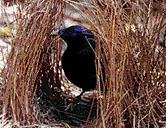
THURSDAY, Dec. 3 (HealthDay News) — Many people think evolution takes hundreds, if not thousands, of years, but it can happen much faster and new research shows exactly how: The simple act of feeding birds in winter appears to be having an effect on a population of birds.
Researchers, who report their findings in the Dec. 3 online edition of Current Biology, said a single population of blackcap birds has split into two distinct groups in fewer than 30 generations. The population of birds did this despite breeding next to each other in the same forests; now the birds are as different from each other in some ways as those separated by hundreds of miles.
The difference between the groups can be found in their migration patterns, which changed after humans began feeding some of the birds during winter. “The new northwest migratory route is shorter, and those birds feed on food provided by humans instead of fruits as the birds that migrate southwest do,” study author H. Martin Schaefer, of the University of Freiburg in Germany, said in a news release from the journal’s publisher.
“As a consequence, birds migrating northwest have rounder wings, which provide better maneuverability but make them less suited for long-distance migration,” he explained.
“Our study documents the profound impact of human activities on the evolutionary trajectories of species,” Schaefer said. “It shows that we are influencing the fate not only of rare and endangered species, but also of the common ones that surround our daily lives.”
In the big picture, “this is a nice example of the speed of evolution,” Schaefer noted. “It is something that we can see with our own eyes if we only look closely enough. It doesn’t have to take millions of years.”
More information
Find out about evolution from UC Berkeley.

